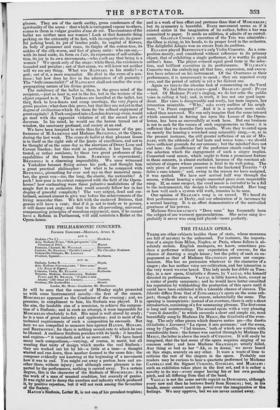THE ITALIAN OPERA.
THERE are other cabinets besides those of state, whose measures are full of mystery to the unlearned. For instance, the importa- tion of a singer from Milan, Naples, or Paris, whose failure is ab- solutely certain. English managers, we know, sometimes pro- duce a performer without any expectation of success, for the chance of drawing a single house ; but the policy of such an en- gagement as that of Madame GRANDOLFI passes our compre- hension. She has no pretension whatever to the character of a singer ; she has neither voice nor cultivation, and her intonation is the very worst weever heard. This lady made her debi t on Tues- day, in a new opera, Giulietta e Romeo, by VACCAI, who himself directed its performance. VACCAI is little known here, except as a writer of pretty canzonets ; and be would have better consulted his reputation by withholding the production of this opera until it could have been exhibited with a tolerable chance of success. The libretto differs from that of ZINGARELLI'S opera on the same stb- ject; though the story is, of course, substantially the same. The opening is inauspicious : instead of an overture, there is only a short introduction, consisting of a few unmeaning phrases. The first scene is long and uninteresting. The second opens with a very pleasing " coro di donzelle;" to which succeeds a short and simple air, most beautifully sung by Madame DE MERIC, the Giulietta of the even- ing. The only other pieces which deserve notice are—the duetto (Giulietta e Lorenzo) "La riposa ii mio germane," and the scena, sung by Capellio, " Ciel timnno," both of which are written with considerable force : the former was carried through by Madame DE MERIC, thelatter is above the reach of CURIONI. It will easily be imagined, that the last scene of the opera requires singing of no common order; and here Madame GRANDOLFI utterly failed. Any thing so bad as her " Ah, se tu dormi," we never heard on this stage, scarcely on any other. It were a waste of time to criticise the rest of the singers in the opera. Probably our readers may be curious to hear a quartette performed by Madame CAsTELLI and the Signori CURIONI, GIUBILEI, and MARIAN! such an exhibition takes place in the first act, and it is rather a novelty in its way—every singer having his or her own peculiar pitch, and all differing from that of the band. VAccAi is not the same servile copyist as DoNizreri, although every now and then he borrows freely from Rossi's' ; but, in his hands, music cannot assert its power over the imagination or the feelings. We may approve, but we are never carried away.



























 Previous page
Previous page